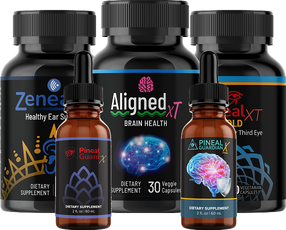The Surprising Link Between Alzheimer’s and This Tiny Brain Organ You’ve Probably Overlooked

You know, I’ve spent a lot of time diving deep into weight loss, nutrition hacks, and the latest diet trends.
But today, I want to take you on a bit of a detour. This time, we’re diving into something less talked about but just as crucial for your health… Alzheimer’s disease and a surprising way you can help protect your brain.
Now, before you wonder,
“What does this have to do with my waistline or staying healthy?”
Stay with me.
You’ll see that our health isn’t only about the waistline or how many calories we burn. There’s a lesser-known piece to the health puzzle that I think you’ll find fascinating, especially when it could potentially help you live a mentally sharper life as you age.
The Alzheimer’s Threat
Alzheimer’s disease… a term that strikes fear in a lot of people, and for good reason. It’s the leading cause of dementia, affecting millions of people worldwide.
But here’s the scary part…
Your brain can begin showing signs of Alzheimer’s years, even decades, before any noticeable symptoms appear.
Yes, age is the biggest risk factor. But we can’t overlook how genetics and our daily lifestyle choices—like sleep, stress, and even diet—play a crucial role in brain health. It’s like a slow-burning fire that you overlook until the smoke fills the room; by then, it’s already too late.
But here’s where things get interesting…
While everyone’s focused on heart health, weight loss, or staying fit, a lesser-known piece of the Alzheimer’s puzzle could offer a surprising defense mechanism.
The Brain’s Overlooked Ally

Tucked away deep within your brain is a small organ called the pineal gland.
You’ve probably never given it much thought… few people do.
But this little gland produces melatonin, the hormone that regulates sleep. And as it turns out, melatonin does much more than help you get a good night’s rest.
Research suggests that melatonin plays a role in protecting your brain from oxidative stress, one of the major culprits behind age-related cognitive decline and Alzheimer’s disease.
Here’s where things get interesting…
Studies have shown that people with Alzheimer’s tend to have lower melatonin levels, and as we age, the production of melatonin from the pineal gland naturally decreases.
So, the big question is:
Can we do anything to support melatonin production and help protect our brain from Alzheimer’s?
Now, this is where things take an exciting turn. If you’ve been following my work, you know I love practical solutions that are simple yet effective.
And one of the most effective ways to boost melatonin production and support your pineal gland is through meditation.
Meditation: The Unexpected Brain Booster

Yes, you read that right—meditation.
It’s not just for relaxation or clearing your mind.
Research is showing that regular meditation can help boost melatonin levels, strengthen the structural health of the brain, and potentially shield the mind from the effects of aging.
In fact, a study published in the Journal of Alzheimer’s Disease found that long-term meditators had greater grey matter volume in regions of the brain associated with memory and executive function… the very areas that Alzheimer’s affects the hardest.
Think of meditation as a natural defense mechanism that gives your brain the rest and repair time it needs.
So why am I telling you this, especially when we’re used to talking about fitness and weight loss? I believe health is about total well-being and that includes the health of your brain.
Think about it…
No matter how great we look or how fit we are, if our mind begins to slip, it impacts every aspect of our lives.
And if a daily meditation practice can help maintain brain health, improve sleep, and even reduce the risk of cognitive decline, it’s something worth considering.
Even better?
Meditation is a powerful tool for managing stress, which we all know can wreak havoc on both our mental and physical health. When stress levels are high, our bodies produce cortisol, which not only affects weight gain but also has long-term impacts on our brain health.
So, in a way, focusing on brain health and managing stress benefits everything… including your waistline.
How to Get Started with Meditation

If meditation feels new or intimidating, don’t worry. It’s simpler than it seems. You don’t have to sit cross-legged on a mountaintop for hours to get results.
Here’s how you can ease into it:
- Start small: Set aside just 5 minutes a day. Find a quiet space, close your eyes, and focus on breathing. That’s it.
- Try a guided meditation: There are plenty of apps with free guided meditations that walk you through the process, which is perfect if you’re just starting.
- Make it part of your routine: Whether first thing in the morning or right before bed, building meditation into your daily schedule can help you stay consistent.
Wrapping up,
At the end of the day, our brain is our most important asset. It holds our memories, shapes our personality, and influences how we navigate the world.
While Alzheimer’s might seem like a distant concern, the steps we take now can have a lasting impact on how we age and how well we maintain our mental sharpness.
This may seem different from our usual weight loss and wellness chats, but protecting your brain is as critical as caring for your body.
Incorporating something as simple as meditation into your routine could give your brain the extra boost it needs to stay strong as the years go by.
What do you think? Have you tried meditation before? If not, does boosting brain health make you curious to try? Let me know in the reply. I’d love to hear your thoughts.




